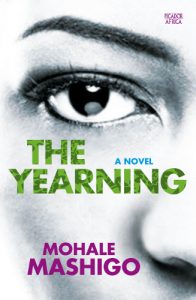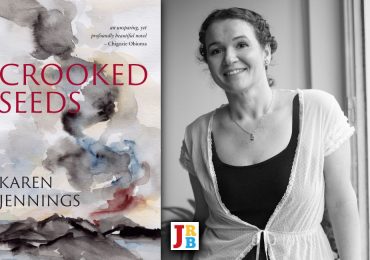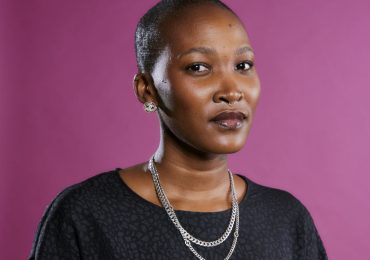As part of our January Conversation Issue, Mohale Mashigo chats to The JRB Editor Jennifer Malec.
 The Yearning
The Yearning
Mohale Mashigo
Picador Africa, 2016
Mohale Mashigo’s debut novel The Yearning recently won the University of Johannesburg Debut Prize for South African Writing in English, and she is one of six African writers shortlisted for the International Dublin Literary Award, known as ‘the world’s richest annual literary prize’. Mashigo was also shortlisted for the First-time Published Author South African Literary Award.
She chatted to Jennifer Malec about the importance of memory, what it’s like to be part of South Africa’s ‘integration generation’, and how it felt to discover black writing.
Jennifer Malec for The JRB: Let me start by congratulating you for winning the UJ Debut Prize, and wish you the best of luck for the International Dublin Literary Award.
Mohale Mashigo: Thank you!
Jennifer Malec: The opening line of The Yearning—‘My mother died seven times before she gave birth to me’—is one of the most striking opening lines I can remember reading in a long time. Did it come to you in a flash, or was it something you laboured over?
Mohale Mashigo: I remember reading ‘124 was spiteful. Full of baby’s venom. The women in the house knew it and so did the children’—the opening lines of Toni Morrison’s Beloved, and I knew immediately that the book had seduced me before I even knew what was happening. I wouldn’t say my opening line came to me in a flash but I had already finished writing the story and I knew what I wanted to hide and reveal in the prologue. I am pleasantly surprised at how many people enjoy that opening line.
Jennifer Malec: From what I understand, you started writing The Yearning while working, unhappily, in marketing, but never finished it. Then years later when you started writing a second book, a friend told you to finish the first book before moving on. I imagine this means you hadn’t planned out The Yearning before you started writing it?
Mohale Mashigo: When I first started writing, it was to distract myself from an awful job. It never occurred to me that I would complete the story and get it published. I have so many unfinished stories because I lack discipline as a writer. I’m not proud of it but that’s who I am.
The story comes to me in bits and pieces and I have to trust myself and the story because I always go in blind and then something happens as I’m writing and fully immersed in the story … The Yearning as a finished book is very different from the story I started writing in 2016. Once I committed to finishing the story, I wrote everywhere and anywhere. Sometimes I would go weeks without writing something and then write for days at a time. It’s all a mess until the very end.
Jennifer Malec: You call Zakes Mda your ‘BFF’, and he encouraged you to publish The Yearning when he read the manuscript. Did he have any other more concrete advice about the novel?
Mohale Mashigo: Ah yes. It’s weird when your BFF is also one of your favourite writers. I don’t know what I was thinking when I sent him the manuscript. What if he hated it? [laughs] Wow! But basically he read the manuscript, gave me a few tips and told me to find a publisher.
Jennifer Malec: You’ve described The Yearning as an illustration of how the specific can become universal. This is an interesting idea with the current perceived demand for ‘relatability’ in media. Do you think a book should be relatable in this way, or can the meaning come from elsewhere?
Mohale Mashigo: There are many ways in which the human experience is common. We all know hunger, pain, loss, and so on, so whenever I write I know that there are things that people can relate to and that is what the foundation of all stories is—human experiences. Past that, I don’t think it’s important for a story to be relatable. We read to be transported to outside of our lives, even when the characters are very much like us.
Jennifer Malec: The Yearning is a story about memory. When Marubini’s father removes her painful memories, she says ‘… there is something good being torn away with the bad.’ Do you think this idea has a wider relevance to South African society?
Mohale Mashigo: Yes. We won’t talk about the bad things that have happened but prefer to role-play this weird rainbow nation nightmare. Sometimes we rob ourselves of valuable lessons when we wipe away memories—be they of apartheid or any kind of trauma. I get that there is a lot of shame and pain in our past but erasing it isn’t going to fix anything. This country is such a frustrating place; we bury our stories and memories and wonder why we are in so much pain.
Jennifer Malec: The Yearning is spoken about as a book that describes the confrontation or juxtaposition between traditional and modern South African life, but it seems to me that your protagonist, Marubini, is able to travel between those worlds pretty comfortably.
Mohale Mashigo: That was my intention. I was part of the ‘integration generation’. We were young enough to learn how to learn the ways of the other people but also old enough to understand the ways of our people. It was my intention to show that there are many people in this country who unconsciously code-switch, both linguistically and culturally. Marubini does not value one culture over another but she also knows that when Western things fail, there is no shame in going home for your healing. There are many ways to heal.
Jennifer Malec: The characters in the book are wonderful examples of how being different is not something to be feared, which seems to be an important lesson in a South Africa that is still being learned. Was it difficult to to negotiate that space, to write ‘different’ characters who did not become clownish or contrived?
Mohale Mashigo: No, it wasn’t, because almost everyone in this book is someone I could be related to. I respect and love the characters in the novel, perhaps that’s why they never became caricatures. The humanity of the characters is very important to me, much more important than plot.
Jennifer Malec: You’ve spoken about how, despite the fact that you were a big reader as a child, it was The Colour Purple and later Nervous Conditions and Ways of Dying that changed your perspective on reading.
Mohale Mashigo: I was happily reading Pippi Longstocking and books by Roald Dahl when I found The Colour Purple. Before that I had never read books by and about black people. Granted, it was a very mature book for me to read at the time, but it opened something in me. Before, I was just a spectator in the literary world and suddenly I felt like people like me could also get in on the action.
Nervous Conditions came into my life when I was in high school. Even then I didn’t know people were writing books about Africans. My uncle is from Zimbabwe so Nervous Conditions felt like it could be about people I knew. Suddenly it occurred to me that I could write about people I knew—that we belonged in stories too.
Ways of Dying gave me permission to write about the ‘ugly thing’ while humanising the people involved in it. Those three books really made me the writer that I am.
Jennifer Malec: Do you have similar hopes that your own book could do the same for others?
Mohale Mashigo: Oh goodness. I hope The Yearning gives more than it takes.
Jennifer Malec: You use the name Black Porcelain in your music career, and took your mother’s maiden name, Mohale, as a pen name. Do you find taking a different name helps your creative process? Do you feel you are inhabiting a different personality?
Mohale Mashigo: Not really, but I am obsessed with names and I like naming different parts of myself. I am so glad I chose to incorporate my mother’s maiden name in my pen name. She’s a great storyteller and I feel like people are acknowledging us both when they call me Mohale. It makes me feel closer to her.
Jennifer Malec: What can we expect from your second book? I see on Twitter that you will be submitting the manuscript this month …
Mohale Mashigo: [laughs] Stalker! It’s going to be very different from The Yearning. That’s all I’m going to say …
- Jennifer Malec is the Editor; follow her on Twitter






One thought on “[Conversation Issue] ‘We bury our stories and wonder why we are in so much pain’—Mohale Mashigo talks to Jennifer Malec about The Yearning”